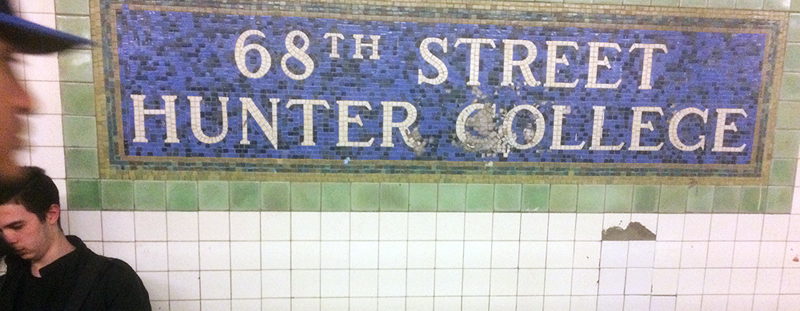
Article by Nida Ali, December 29, 2016
On the night of the presidential election, Mariama Badjie – black, American, and Muslim – was in the East lounge of the Hunter Brookdale Dorms in lower Manhattan, as she watched Donald Trump’s acceptance speech on CNN. It was 4 a.m. and Badjie sat in a plastic chair surrounded by other Brookdale residents her age.
“We were like, it’s all over,” said Badjie, a sophomore from Parkchester, Bronx, who voted for the first time. She interviewed on the North Building bridge and eating her lunch. “We were all like, Oh my God, what just happened. I was definitely crying a little bit.”
Donald Trump’s win in the presidential election has instilled fear in many Muslims. Many believe that his victory reflects the rise of Islamophobia manifesting itself in America.
New York Times Headline: Scope of Hate 2016
“The wait line was three hours at our voting site in Parkchester,” Badjie said. “My brother was looking at his black Muslim hijab sister voting, and then this is what we get. When I heard the election results, it hit me. What was my brother going to think when he woke up in the morning and this man is president.”
Donald Trump’s presidential campaign strategy fed on and fueled anti-Muslim racism. He made it clear that he wanted to implement hostile legal tactics against Muslims for the sake of bogus national security claims. He even went as far as to propose a ban on all Muslim immigration to the United States. When asked about whether his administration would employ a registry for Muslims, Trump said, “absolutely.”
Carl Higbie, a supporter of Trump, cited Japanese-American internment camps as a “precedent” for a Muslim registry that the Trump transition team wants to employ. He made an appearance on “The Kelly File” on Fox News.
“Having a Muslim registry is comparable to the Japanese internment camps,” said Badjie. “This is a big problem. Now that Trump is the president-elect, he needs to show that he’s the president for all people. But based on his potential cabinet that does not seem to be the case.”
Badjie is majoring in community health with a minor in public policy. Wearing a pink dress and a black headscarf, Badjie said in her interview that America has made no progress. “Trump’s presidency tells us that we didn’t make as much progress as we think we did,” said Badjie, “and now is the time to do it. This election fueled me to keep pursuing a position in making public policy because we have so much work to do. This is what I need to do until they pull me out of school and put me in a camp in Oklahoma or something.”
According to Badjie, Muslims in America have grown fearful. Many Muslim women will not wear hijabs in public. But Badjie remains firm that she should not be scared and that she believes more than half the country will rise up and not let Islamophobia rise.
“This is to all my Muslims,” said Badjie, “don’t despair, have faith. Everything happens for a good reason. Allah got us, we’re good, we’re covered. But we need to not sit back and be apolitical. The political arena involves us and needs us.”
Dahlia Tarek, a senior majoring in psychology sitting in the Muslim Student Association clubroom, said in her interview that she expected that Trump was going to be elected president. Tarek said, she “had a feeling” that Hillary Clinton wasn’t going to win.
“In a country like this,” said Tarek, 21, “no one would want a woman to run it. I have low expectations of the people in this country.”
Tarek expressed a different view of the future of Muslims in America. She said that Muslims should “sit down and relax” because, according to her, Trump can’t do all of what he says he wants to because of the U.S. Constitution.m“I’m not scared,” Tarek said. “We should be proud of who we are, as long as you’re doing the right thing, God is on your side. Our prophets went through worse circumstances. This is just Trump, he’s an idiot.”
Class of 2016 and a resident of Valley Stream, Long Island, Hibba Mahmud, 22, sat on a small round table in a dimly lit coffee shop on Lexington Avenue. She said she hadn’t expected Trump to win, but she wasn’t extremely surprised that he did. “The elections never surprise me,” said Mahmud, a biochem and sociology major.
“I don’t fear Trump, but his supporters are worrisome. We need to learn how the government works in order to make change and get involved in making policies,” she said. She also said she believed Muslims needed to make a political statement. “Why should we break ourselves on fear of someone else breaking us,” said Mahmud. “That makes no sense.”
Badjie also said, “They want us to stop being Muslim or go be Muslim somewhere else, but I’m not going to give into that and be scared.”
Nida Ali can be reached Nida.Ali39@myhunter.cuny.edu